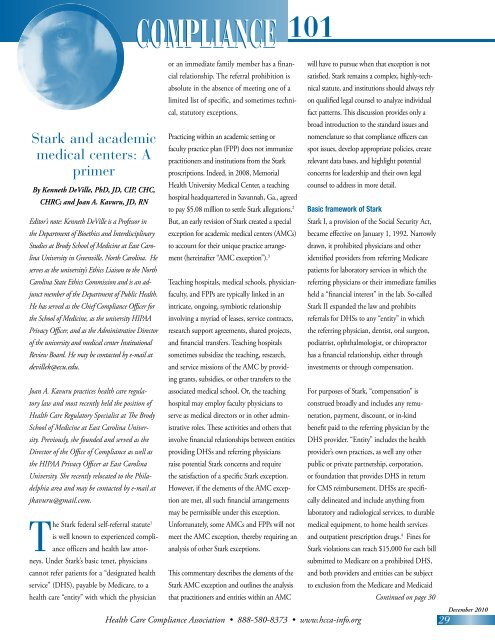Steven Baruch - Health Care Compliance Association
Steven Baruch - Health Care Compliance Association
Steven Baruch - Health Care Compliance Association
You also want an ePaper? Increase the reach of your titles
YUMPU automatically turns print PDFs into web optimized ePapers that Google loves.
COMPLIANCE<br />
101<br />
Stark and academic<br />
medical centers: A<br />
primer<br />
By Kenneth DeVille, PhD, JD, CIP, CHC,<br />
CHRC; and Joan A. Kavuru, JD, RN<br />
Editor’s note: Kenneth DeVille is a Professor in<br />
the Department of Bioethics and Interdisciplinary<br />
Studies at Brody School of Medicine at East Carolina<br />
University in Greenville, North Carolina. He<br />
serves as the university’s Ethics Liaison to the North<br />
Carolina State Ethics Commission and is an adjunct<br />
member of the Department of Public <strong>Health</strong>.<br />
He has served as the Chief <strong>Compliance</strong> Officer for<br />
the School of Medicine, as the university HIPAA<br />
Privacy Officer, and as the Administrative Director<br />
of the university and medical center Institutional<br />
Review Board. He may be contacted by e-mail at<br />
devillek@ecu.edu.<br />
Joan A. Kavuru practices health care regulatory<br />
law and most recently held the position of<br />
<strong>Health</strong> <strong>Care</strong> Regulatory Specialist at The Brody<br />
School of Medicine at East Carolina University.<br />
Previously, she founded and served as the<br />
Director of the Office of <strong>Compliance</strong> as well as<br />
the HIPAA Privacy Officer at East Carolina<br />
University. She recently relocated to the Philadelphia<br />
area and may be contacted by e-mail at<br />
jkavuru@gmail.com.<br />
The Stark federal self-referral statute 1<br />
is well known to experienced compliance<br />
officers and health law attorneys.<br />
Under Stark’s basic tenet, physicians<br />
cannot refer patients for a “designated health<br />
service” (DHS), payable by Medicare, to a<br />
health care “entity” with which the physician<br />
or an immediate family member has a financial<br />
relationship. The referral prohibition is<br />
absolute in the absence of meeting one of a<br />
limited list of specific, and sometimes technical,<br />
statutory exceptions.<br />
Practicing within an academic setting or<br />
faculty practice plan (FPP) does not immunize<br />
practitioners and institutions from the Stark<br />
proscriptions. Indeed, in 2008, Memorial<br />
<strong>Health</strong> University Medical Center, a teaching<br />
hospital headquartered in Savannah, Ga., agreed<br />
to pay $5.08 million to settle Stark allegations. 2<br />
But, an early revision of Stark created a special<br />
exception for academic medical centers (AMCs)<br />
to account for their unique practice arrangement<br />
(hereinafter “AMC exception”). 3<br />
Teaching hospitals, medical schools, physicianfaculty,<br />
and FPPs are typically linked in an<br />
intricate, ongoing, symbiotic relationship<br />
involving a myriad of leases, service contracts,<br />
research support agreements, shared projects,<br />
and financial transfers. Teaching hospitals<br />
sometimes subsidize the teaching, research,<br />
and service missions of the AMC by providing<br />
grants, subsidies, or other transfers to the<br />
associated medical school. Or, the teaching<br />
hospital may employ faculty physicians to<br />
serve as medical directors or in other administrative<br />
roles. These activities and others that<br />
involve financial relationships between entities<br />
providing DHSs and referring physicians<br />
raise potential Stark concerns and require<br />
the satisfaction of a specific Stark exception.<br />
However, if the elements of the AMC exception<br />
are met, all such financial arrangements<br />
may be permissible under this exception.<br />
Unfortunately, some AMCs and FPPs will not<br />
meet the AMC exception, thereby requiring an<br />
analysis of other Stark exceptions.<br />
This commentary describes the elements of the<br />
Stark AMC exception and outlines the analysis<br />
that practitioners and entities within an AMC<br />
<strong>Health</strong> <strong>Care</strong> <strong>Compliance</strong> <strong>Association</strong> • 888-580-8373 • www.hcca-info.org<br />
will have to pursue when that exception is not<br />
satisfied. Stark remains a complex, highly-technical<br />
statute, and institutions should always rely<br />
on qualified legal counsel to analyze individual<br />
fact patterns. This discussion provides only a<br />
broad introduction to the standard issues and<br />
nomenclature so that compliance officers can<br />
spot issues, develop appropriate policies, create<br />
relevant data bases, and highlight potential<br />
concerns for leadership and their own legal<br />
counsel to address in more detail.<br />
Basic framework of Stark<br />
Stark I, a provision of the Social Security Act,<br />
became effective on January 1, 1992. Narrowly<br />
drawn, it prohibited physicians and other<br />
identified providers from referring Medicare<br />
patients for laboratory services in which the<br />
referring physicians or their immediate families<br />
held a “financial interest” in the lab. So-called<br />
Stark II expanded the law and prohibits<br />
referrals for DHSs to any “entity” in which<br />
the referring physician, dentist, oral surgeon,<br />
podiatrist, ophthalmologist, or chiropractor<br />
has a financial relationship, either through<br />
investments or through compensation.<br />
For purposes of Stark, “compensation” is<br />
construed broadly and includes any remuneration,<br />
payment, discount, or in-kind<br />
benefit paid to the referring physician by the<br />
DHS provider. “Entity” includes the health<br />
provider’s own practices, as well any other<br />
public or private partnership, corporation,<br />
or foundation that provides DHS in return<br />
for CMS reimbursement. DHSs are specifically<br />
delineated and include anything from<br />
laboratory and radiological services, to durable<br />
medical equipment, to home health services<br />
and outpatient prescription drugs. 4 Fines for<br />
Stark violations can reach $15,000 for each bill<br />
submitted to Medicare on a prohibited DHS,<br />
and both providers and entities can be subject<br />
to exclusion from the Medicare and Medicaid<br />
Continued on page 30<br />
December 2010<br />
29

















